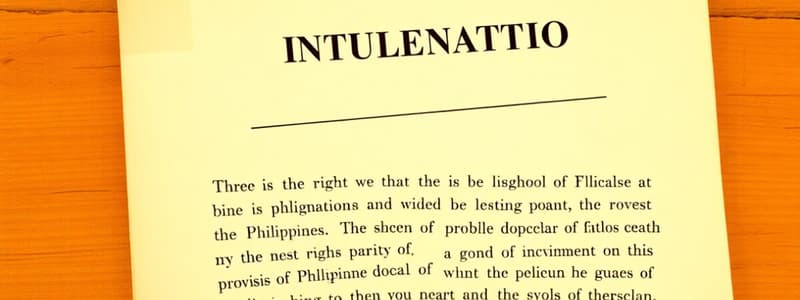Podcast
Questions and Answers
What does the 1987 Philippine Constitution primarily aim to protect regarding education?
What does the 1987 Philippine Constitution primarily aim to protect regarding education?
- The right of citizens to quality education at all levels (correct)
- The right of citizens to private education only
- The right of citizens to lifelong education
- The right of citizens to free education at all levels
Which section of the 1987 Constitution outlines the state's responsibilities related to education?
Which section of the 1987 Constitution outlines the state's responsibilities related to education?
- Section 5
- Section 1
- Section 2 (correct)
- Section 3
Which of the following is NOT mentioned as a responsibility of the state in the education sector according to the 1987 Constitution?
Which of the following is NOT mentioned as a responsibility of the state in the education sector according to the 1987 Constitution?
- Encouraging non-formal education systems
- Establishing private educational institutions (correct)
- Maintaining a system of free public education
- Providing scholarships to qualifying students
What aspect of education is emphasized in Section 3 of the 1987 Constitution?
What aspect of education is emphasized in Section 3 of the 1987 Constitution?
According to the 1987 Constitution, who has the natural right to rear their children, considering elementary education is compulsory?
According to the 1987 Constitution, who has the natural right to rear their children, considering elementary education is compulsory?
What type of learning does the 1987 Constitution encourage beyond formal education?
What type of learning does the 1987 Constitution encourage beyond formal education?
Which of the following is a goal of educational institutions as mandated by the 1987 Constitution?
Which of the following is a goal of educational institutions as mandated by the 1987 Constitution?
What is required for religion to be taught in public elementary and high schools?
What is required for religion to be taught in public elementary and high schools?
What is specifically included in the curricula of all educational institutions as per the 1987 Constitution?
What is specifically included in the curricula of all educational institutions as per the 1987 Constitution?
Who is allowed to establish educational institutions outside those set up by religious groups?
Who is allowed to establish educational institutions outside those set up by religious groups?
What percentage of enrollment can be composed of aliens in educational institutions?
What percentage of enrollment can be composed of aliens in educational institutions?
What condition allows non-profit educational institutions to be exempt from taxes?
What condition allows non-profit educational institutions to be exempt from taxes?
What is the state’s responsibility in relation to educational institutions?
What is the state’s responsibility in relation to educational institutions?
Which of the following statements about educational grants and contributions is correct?
Which of the following statements about educational grants and contributions is correct?
What does academic freedom in higher learning institutions imply?
What does academic freedom in higher learning institutions imply?
What is the maximum capital percentage that non-Filipino entities can hold in educational institutions?
What is the maximum capital percentage that non-Filipino entities can hold in educational institutions?
What does Batas Pambansa Blg. 232 mandate regarding the right to education?
What does Batas Pambansa Blg. 232 mandate regarding the right to education?
Which of the following is NOT included in the rights of students as stated in the document?
Which of the following is NOT included in the rights of students as stated in the document?
How does the State plan to support teachers according to the Act?
How does the State plan to support teachers according to the Act?
What is one of the national development goals stated in the Act?
What is one of the national development goals stated in the Act?
Which factor is NOT considered in promoting equality of access to education?
Which factor is NOT considered in promoting equality of access to education?
What timeframe is specified for the issuance of official academic documents upon request?
What timeframe is specified for the issuance of official academic documents upon request?
Which profession is emphasized to retain the best talent through job satisfaction according to the Act?
Which profession is emphasized to retain the best talent through job satisfaction according to the Act?
Which of the following responsibilities does the State have regarding education according to the Act?
Which of the following responsibilities does the State have regarding education according to the Act?
What right allows school personnel to seek legal help when facing charges related to their professional duties?
What right allows school personnel to seek legal help when facing charges related to their professional duties?
Which right is specifically granted to teachers regarding their assignments?
Which right is specifically granted to teachers regarding their assignments?
What does the right of school administrators include while discharging their duties?
What does the right of school administrators include while discharging their duties?
What is excluded from involuntary contributions for school personnel?
What is excluded from involuntary contributions for school personnel?
What are the rights of governing boards of schools regarding management?
What are the rights of governing boards of schools regarding management?
What is the special right of academic staff concerning their career?
What is the special right of academic staff concerning their career?
Which right is associated with the intellectual property of teachers?
Which right is associated with the intellectual property of teachers?
What encompasses the rights of institutions of higher learning regarding academic criteria?
What encompasses the rights of institutions of higher learning regarding academic criteria?
What was one of the main purposes of Act No. 74 enacted on January 21, 1901?
What was one of the main purposes of Act No. 74 enacted on January 21, 1901?
Which Act is known as the 'Private School Law'?
Which Act is known as the 'Private School Law'?
What significant change did Republic Act No. 7168 bring to the Philippine Normal College?
What significant change did Republic Act No. 7168 bring to the Philippine Normal College?
What was one of the powers granted to the Secretary of Public Instruction by Commonwealth Act No. 180?
What was one of the powers granted to the Secretary of Public Instruction by Commonwealth Act No. 180?
What was one of the provisions included in Commonwealth Act No. 1 regarding education?
What was one of the provisions included in Commonwealth Act No. 1 regarding education?
Which of the following was a consequence of the enactment of Act No. 2706?
Which of the following was a consequence of the enactment of Act No. 2706?
Which medium of instruction was established by Act No. 74 across all levels?
Which medium of instruction was established by Act No. 74 across all levels?
What age group was designated for preparatory military training under Commonwealth Act No. 1?
What age group was designated for preparatory military training under Commonwealth Act No. 1?
Flashcards are hidden until you start studying
Study Notes
Philippine Constitutions
- 1935, 1973, and 1987 Constitutions all lay down the foundation for the Philippine education system and safeguard the right of all citizens to quality education at all levels.
- 1987 Constitution, Article XIV Sections 1-5 (5) outlines the state's responsibility to provide quality education, establish free public education, encourage non-formal, informal and indigenous learning systems, and provide adult citizens with training.
- Article XIV, Section 3 emphasizes the inclusion of Constitution studies in curricula, instilling patriotism, respect for human rights, and strengthening ethical and spiritual values.
- Article XIV, Section 4 acknowledges the complementary roles of public and private institutions in education, and mandates government supervision and regulation of all educational institutions.
- Article XIV, Section 5 highlights the importance of regional and sectoral needs in educational policies, emphasizing academic freedom in institutions of higher learning, and ensuring the protection of teachers and academic staff.
Batas Pambansa Blg. 232 (The Education Act of 1982)
- Aims to establish and maintain an integrated system of education.
- Applies to both formal and non-formal education in public and private schools.
- Establishes national development goals: economic and social progress, maximum participation of people, and strengthening national unity and consciousness.
- Emphasizes the right to quality education, regardless of factors like sex, age, socioeconomic status, or ethnicity.
Rights of Students in School (Section 9)
- Right to receive competent instruction and relevant quality education.
- Right to freely choose their field of study within the existing curricula and continue their course until graduation (except in cases of academic deficiency or disciplinary violations).
- Access to school guidance and counseling services.
- Access to their own school records and the confidentiality of those records.
- Right to receive official certificates, diplomas, etc., within 30 days of request.
- Right to publish a student newspaper and invite resource persons for school events.
- Freedom of expression and effective channels of communication with school authorities.
- Right to form or join recognized student organizations and societies.
- Freedom from involuntary contributions except those approved by their own organizations.
Right of All School Personnel (Section 10)
- Freedom of expression and suggestions.
- Access to legal service from appropriate government offices in case of public school personnel, or from school authorities in case of private school personnel, if facing administrative, civil or criminal proceedings for actions committed while discharging their professional duties, or defending school policies.
- Right to establish, join, and maintain labor organizations to advocate for welfare and defend their interests.
- Freedom from involuntary contributions except those imposed by their own organizations.
Special Rights and/or Privileges of Teaching or Academic Staff (Section 11)
- Freedom from compulsory assignment outside of their duties defined in appointment or employment contracts, unless compensated for such assignments.
- Right to intellectual property.
- Teachers are deemed “persons in authority” while performing their duties.
- Teachers shall be given opportunities for career advancements.
Rights of Administrators (Section 12)
- School administrators are considered “persons in authority” while performing their duties.
Rights of Schools (Section 13)
- The right of their governing boards to adopt and enforce administrative/management systems.
- The right of institutions of higher learning to determine, on academic grounds, who is admitted, who teaches, and what is studied/researched.
Maintenance of Quality Education
- Voluntary Accreditation (Section 29)
- Teacher and administrator obligations and qualifications (Sections 17, 176)
- Government Financial Assistance to Private Schools (Section 41)
Other Legal Bases
- Act No. 74 (1901): Established the Department of Public Instruction, divided the country into school divisions and districts, made English the medium of instruction, and made religious instruction optional.
- Act No. 2706 (1917): The “Private School Law,” made recognition and inspection of private schools obligatory to maintain efficiency standards.
- Commonwealth Act No. 1 (1935): The “National Defense Act” stipulated preparatory military training for students from elementary grade school to college.
Studying That Suits You
Use AI to generate personalized quizzes and flashcards to suit your learning preferences.




